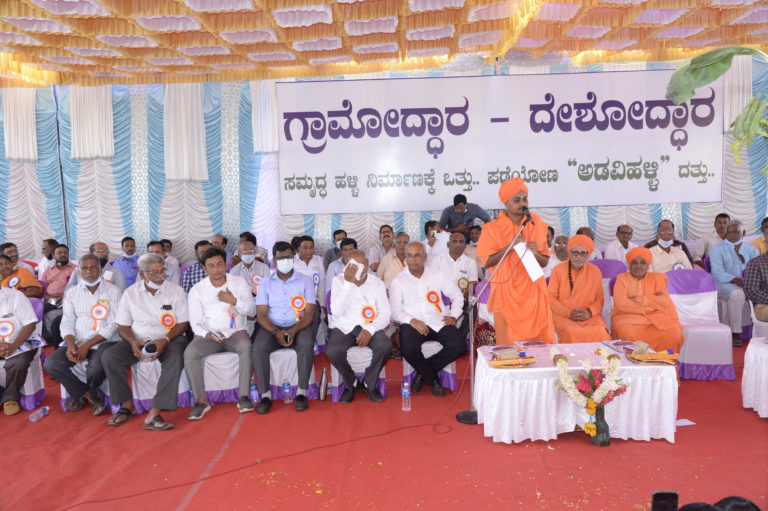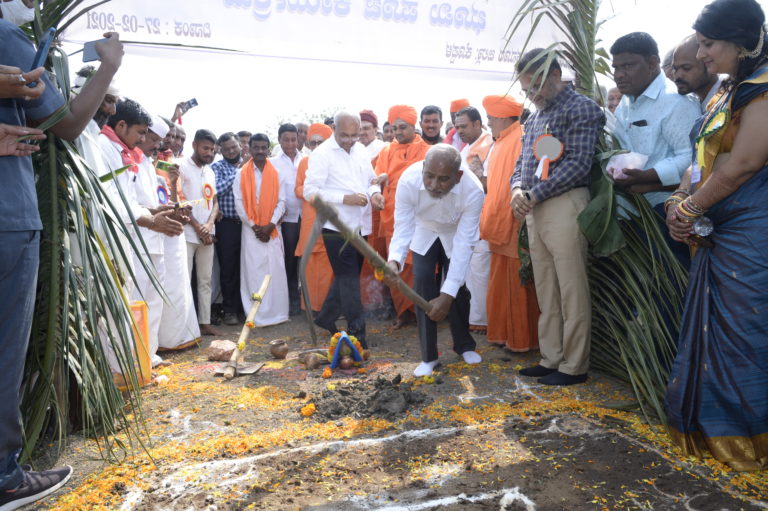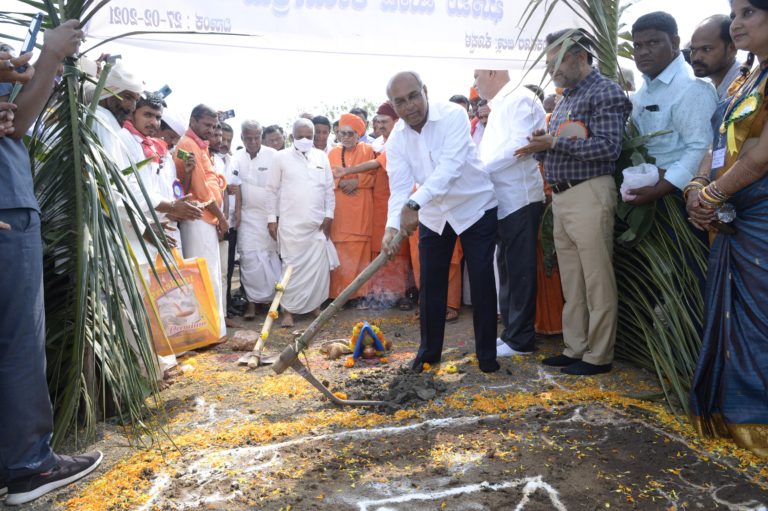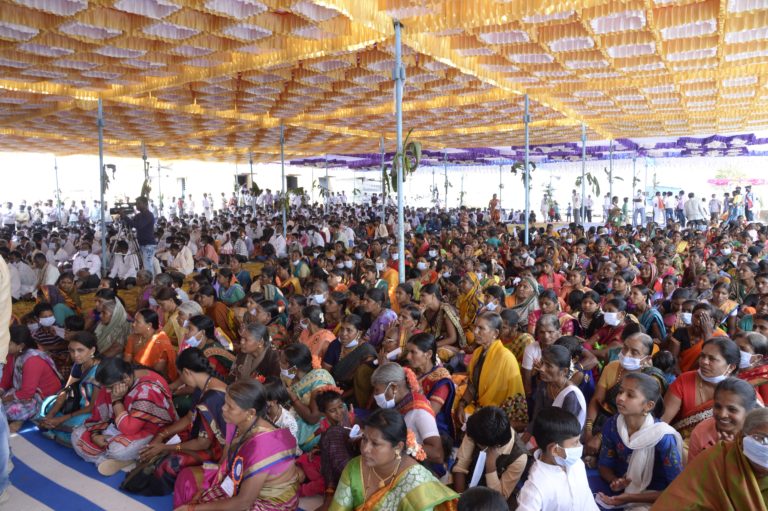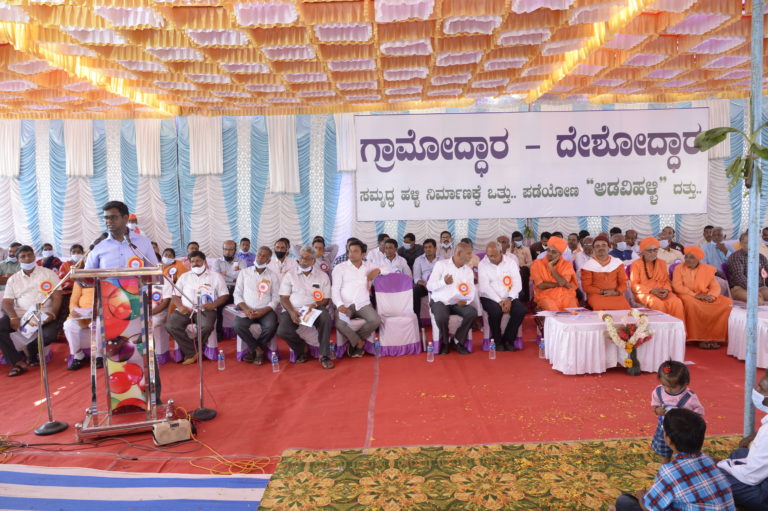Model Village Program
Improving overall growth of villages
About the Program
An emerging program that the organization is keen on developing in the coming years is the Model village program. Currently there are two major model villages program – in Bidadi (Ramanagara District) and in Mangalagudda and Hanumanala.
The program focuses all aspects of the village population such as health, education, women empowerment, livelihood creation. A combination of activities – skill development, agriculture management sanitation and waste management, are conducted to achieve greater impact. We have successfully converted Medanahalli village in Bidadi industrial area as a model village and will be dedicating the village to civil and the elected administration of Bidadi.
- 900+ women were supported through SHG support program in microfinance, economic inclusion and IGP activities.
- 500+ women and adolescent girls were supported through menstrual hygiene program.
- 2000+ children from government schools were supported through the WaSH program.
- 3000+ patients were treated through general and thematic health camps in the model villages.
- 10000+ people were impacted through better access to safe drinking water.
- Greater success to achieve an open defecation-free village.
Key Activities
- Health
- Agriculture initiative with IFS and horticulture as part of sustainable agriculture
- Livelihood (SHG engagement)
- Access to Safe drinking water
- Sanitation & WaSH
- Education support
Health
We organized thematic and general health camps in the MVP villages with the support from local Primary Health Centre, Community Health Centre, Department of Health, Department of women and child welfare, Raja Rajeshwari Medical College Hospital, Modi Eye Hospital, BGS Medical College Hospital, Shyanubagh Hospital and Manasa Multi-speciality Hospital Bidadi.
Renowned gynaecologist. Geeta Shanbagh from Shyanubagh Hospital, Dr. Shyam from Raja Rajeshwari Medical College Hospital, National Award winning Dr. Padmaskhi were part of these health camps and services ranging from Eye care, Gynaecology care, Paediatric, Orthopaedic care along with general health, were provided during these camps for women, Children, and general population of the villages in and around the Model village areas.
Impact:
- Over 3000 patients were provided with health checks during the camps
- Awareness on healthy lifestyles and improved health seeking behavior.
- Rejection of quacks from the villages.
- Identified 30 malnourished children so far during these programs and provided supplements.
- 200 children have been assessed in 8 programs.
- Brought in greater awareness of health of children among the parents
- Knowledge on how to help children grow
- 50 women supported by nutri-garden benefiting over 200 population in their families.
- Over 150 women have started growing vegetables in their own back yards.
- Over 40 malnourished women are identified and referred to services from PHC and provided nutritional supplements
- Health has improved among these women since the intervention
- 400 women were reached out through nutritional awareness program
Agriculture Support
In an effort to improve their livelihood, small and marginal farmers from the Model Villages are engaged to enhance their farming skills and improve their output. These farmers are provided with assistance by training in skills and sustainable farming techniques, and supporting them to link with government schemes and services.
Impact:
- Over 75 acres of land cultivated which will provide round the year crop at least until water source is available
- Increased storage of water with a total capacity over 58,50,000 liters from the 7 farm ponds increased irrigation facility for over 20 acres of barren land.
- Storage water helped in extending farming activity into summer with additional crop and income.
- Increased soil health with multi cropping.
- Over 50 acre of agriculture land protected from soil erosion with improvised fodder plantations in the slopes and bunds.
- Improved health of the cattle with better and improvised fodder against the feed.
- Generated better round the year income including crops during summer due to farm ponds.
- Better plant protection means due to trainings received and feedback received during field demonstrations.
- Less dependency on a single crop.
- Instances of loss due to price crash, crop destruction have come down.
Livelihood Creation
As part of the Model Village initiative, women from 50 SHGs were supported in multiple activities, ranging from support for micro-finance, to engaging in livelihood opportunities and trainings. A series of trainings were organized on activities such as mushroom cultivation, food processing, value addition of food products, maintenance of hygiene, packaging of the products, book keeping and finance management. As part of the program, mushroom sponges (seeds), packaging materials, hygiene management materials, local market linkages and technical services from various government departments, were provided.
Impact:
- Level 1: Basic Economic improvements with improved income, reduced dependency on male members of the family, Additional income to the family.
- Level 2: Improvement of functionality in the community with increased confidence to take risks in life, financial knowledge, Increased respect of the village community.
- Level 3: Self Development with increased self-respect, economically independent.
Sanitation and Wash
SIRDS along with HCCBPL and Government of Karnataka has ensured continues engagement with local communities by conducting awareness program on use of sanitation As a result, we are at the verge of two villages in Bidadi location are being declared as Open defecation free villages soon. The units were handed over to the beneficiary with complete sanitary cleaning kits along with education on using the sanitation unit and stop open defecation by personnel from KVK and SIRDS and complete Hand wash training as part of WaSH activity.
Impact:
- Improved health status & reduced absentees in the schools.
- Increased awareness on hand hygiene habits.
- Correct way to adopt hand washing among the school children in the MVP villages to benefit over 5 schools with over 500 students.
- Knowledge and support for Asha and Anganwadi to support over 500 children over 30 Anganwadies and villages.
- Knowledge and training to ASHA to cater to benefit over 500 families in the vicinity of MVP villages.
- Improved cleanliness in the roads with clean and neat streets and proper garbage disposal benefiting over 300 households with over 1000 population.
- Dog menace has reduced.
- Open defecation is contained to 100% in the MVP intervention villages.
Access to safe drinking water
As part of access to safe drinking water initiative of the Model village program, SIRDS along with donors have installed water treatment units in 35 government schools and 8 communities. The School RO units are also provided with long term AMC to support in continuously making clean and safe drinking water to the children in these schools. This has resulted in answering the big impediments of availability of water for children, especially girl child, and helped in reducing in absenteeism and dropouts.
The community RO units provide clean and safe water to the communities in and around the units. These units are currently installed in the villages on sustainable model where a minimum amount is being charged for each can of 20-25 litres.
Impact:
- Over 5000 students benefit from the installation of RO units in the schools from age group of 6-15.
- 2000 households with over 10000 population benefited from the RO unit for safe drinking water.
- 35 Anganwadies with over 700 children are supported through water dispensers and RO units.
- Safe drinking water availability has increased the school attendance of students up by 5% with around 80% students are regular to school.
- Decrease in water borne diseases among School children.
- 20% decrease in school children missing school due to illness.
- Greater awareness on safe drinking water and increased consumption.
- Less number of waterborne diseases.
- 5% dip in cases registered in the local PHC on waterborne diseases.
Model Village at Adavihalli - Koppal
2000+ Villagers
